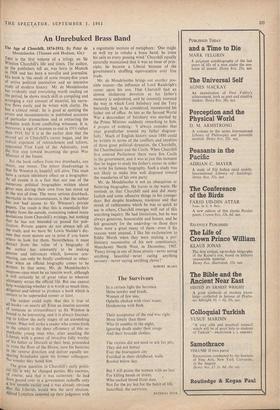An Unrebuked Brass Band
The Age of Churchill, 18744911. By Peter de Mendelssohn. (Thames and Hudson, 42s.) Tuts is the first volume of a trilogy on Sir Winston Churchill's life and times. The author, so the publishers tell us, was born in Munich in 1908 and has been a novelist and journalist. His book is 'the result of some twenty-five years of active political journalism and an intensive study of modern history: Mr. de Mendelssohn has evidently read everything worth reading on the period, he shows much skill in compiling and arranging a vast amount of material, his narra- tive flows easily and he writes with clarity. He has a critical mind.: he is good at spotting the errors and inconsistencies in published accounts of particular transactions and at extracting the probable truth from conflicting witnesses. It is, moreover, a sign of acumen to end in 1911 rather than 1914, for it is at the earlier date that the second act in Churchill's career began, and the radical exponent of retrenchment and reform, appointed First Lord of the Admiralty, took the first step toward becoming the great War Minister of the future.
But the book suffers from two drawbacks, one major, one minor., The minor disadvantage is that Sir Winston is, happO, still alive. This must have a certain inhibitory effect on a biographer. At all events it is a fact that not one of the numerous political biographies written about great men during, their own lives has stood up to the test of time. The more serious drawback, inevitable in the circumstances, is that the author has not had access to Sir Winston's private Papers. The result is that this is essentially bio- graphy from the outside, containing indeed many quotations from Churchill's writings, but nothing that he has not intended or passed for pub- lication. Private papers do not always tell all the truth, and we have Sir Lewis Namier's dic- tum that most secrets are in print if you know where to look for them. Nevertheless, it must detract from the value of a biography if the author has constantly to be making guesses and inferences which, however con- vincing, can only be finally confirmed or other- wise when an official biography comes to be written. In that sense, Mr. de Mendelssohn's Magnum opus must be an interim work, although it will certainly be of great value to whoever ultimately writes the official life. But one cannot help wondering whether it is worth so much time, diligence and labour to produce a book which is certain to be superseded sooner or later.
The author could reply that this is true of all books—or nearly all. Even an interim account of someone as extraordinary as Sir Winston is bound to be interesting, and it is always fascinat- ing to follow the early stages of an astonishing career. What will strike a reader who comes fresh to the subject is the sheer effrontery of this re- markable young man who, after assailing the Liberals with a power of invective fully worthy of his father or Disraeli at their best, proceeded to cross the floor of the House, turn his batteries in the reverse direction and deliver equally un- sParing broadsides upon his former colleagues. No wonder they hated him.
The great question in Churchill's early politi- cal life is why he changed parties. His enemies, of course, said that it was careerism : he had been passed over in a government reshuffle only a few months earlier and it was already obvious that the Liberals would win the next election. Alfred Lyttelton summed up their judgment with
a regrettable mixture of metaphors: 'One might as well try to rebuke a brass band; he trims his sails to every passing wind.' Churchill equally naturally maintained that it was an issue of prin- ciple; he became a Liberal because of the government's shuffling equivocation over free trade.
Mr. de Mendelssohn brings out another pos- sible reason—the influence of Lord Randolph's career upon his son. That Churchill had an almost idolatrous devotion to his father's memory is undoubted, and he intensely resented the way in which Lord Salisbury and the Tory hierarchy had, as he considered, manoeuvred his father out of office. As late as the Second World War a descendant of Salisbury was startled by the Prime Minister suddenly remarking to him, d propos of nothing: 'I always consider that your grandfather treated my father disgrace- fully.' Much of English history since 1880 could be written in terms of the conflicts and loyalties of three great political dynasties, the Churchills, the Chamberlains and the Cecils. When Churchill first entered Parliament there were five Cecils in the government, and it was at just this moment that he began to study his father's career in order to write his famous biography. Such a study was not likely to make him well disposed toward the mandarins of his own party.
Mr. de Mendelssohn is not an obsequious or flattering biographer. He leaves in the warts. He reminds us that Churchill said and did many foolish and some offensive things in his younger days. But despite brashness, insolence and that streak of ruthlessness which he was so quick to see in others, Churchill emerges well out of tliis searching inquiry. He had limitations, but he was always generous, honourable and honest, and he felt genuinely for the underdog—in those days there were a great many of them—even if his reasons were unusual. I like his exclamation to Eddie Marsh when they were making a pre- liminary reconnoitre of his new constituency, Manchester North West, in December, 1905. 'Fancy living in one of those,streets—never seeing anything beautiful—never eating anything savoury—never saying anything clever!'
ROBERT BLAKE


































 Previous page
Previous page